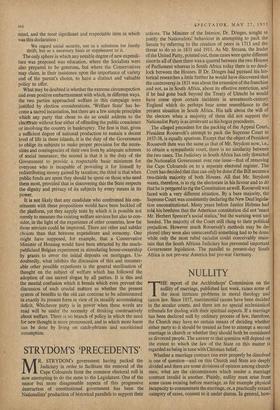STRYDOM'S 'PRECEDENTS'
actions. The Minister of the Interior, Dr. Dtinges, sought to justify the Nationalists' behaviour in attempting to pack the Senate by 'referring to the creation of peers in 1713 and the threat to do so in 1831 and 1911. As Mr. Strauss, the leader of the United Party, pointed out, these cases were quite different since•in all of them there was a quarrel between the two Houses of Parliament whereas in South Africa today there is no dead- lock between the Houses. If Dr. Donges had pursued his his- torical researches a little further he would have discovered that the controversy in 1831 was about the extension of the franchise and not, as in South Africa, about its effective restriction, and if he had gone back beyond the Treaty of Utrecht he would have come upon certain incidents in seventeenth-century England which do perhaps bear some resemblance to the present situation in South Africa. His talk about the will of the electors when a majority of them did not support the Nationalist Party is as irrelevant as his bogus precedents.
The alleged precedent for the packing of the Appeal Court, President Roosevelt's attempt to pack the Supreme Court in 1937-38, is equally spurious. Except that the object of President Roosevelt then was the same as that of Mr. Strydom now, i.e., to obtain a sympathetic court, there is no similarity between the two cases. The Judiciary in South Africa has only thwarted the Nationalist Government over one issue—that of removing the Cape Coloureds on to a separate electoral register. The Court has decided that that can only be done if the Bill secures a two-thirds majority of both Houses. All that Mr. Strydom wants, therefore, is to rig the electorate in his favour and to do that he is prepared to rig the Constitution as well. Roosevelt was faced with a very different situation. By a bare majority, the Supreme Cotirt was consistently declaring the New Deal legisla- tion unconstitutional. Many years before Justice Holmes had told his brethren that the Atherican constitution did not 'enact Mr. Herbert Spencer's social statics,' but the warning went un- heeded. The majority of the Court still clung to their political prejudices. However much Roosevelt's methods may be de- plored (they were also unsuccessful) something had to be done, while only the most rabid racialist could conceivably main- tain that the South African Judiciary has prevented important Government legislation. The parallel to present-day South Africa is not pre-war America but pre-war Germany.


































 Previous page
Previous page